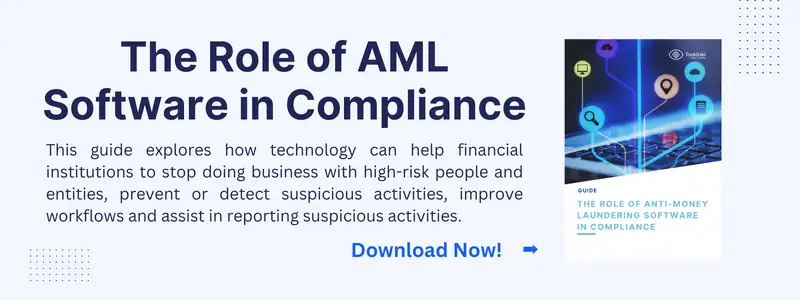The Role of Tookitaki's AFC Ecosystem in Creating a Culture of Compliance
In a world where financial transactions are becoming increasingly complex and international, the importance of a solid compliance culture within financial institutions can't be overstated. This blog will delve into the critical role of a robust compliance culture in combating financial crimes such as money laundering and how innovative platforms like Tookitaki's Anti-Financial Crime (AFC) Ecosystem can help foster such a culture.
Within a financial institution, a culture of compliance goes beyond ticking off regulatory checkboxes. It is a mindset of shared attitudes that values ethical conduct and commitment to adhere to rules, regulations, and best practices to prevent financial crime. It is about creating an environment where every decision is weighed with compliance in mind, and every action is taken, knowing full well the broader consequences of non-compliance.
In the upcoming sections, we will take a closer look at the current state of compliance culture, why a strong compliance culture is necessary, and how Tookitaki's AFC Ecosystem can make a significant impact.
Understanding Compliance Culture
At its core, a compliance culture is the establishment and embedding of norms and values within an organization that prioritize adherence to laws, regulations, standards, and ethical practices. These norms and values guide all decisions and actions within the organization, from the highest levels of management down to the individual employees.
A strong compliance culture is a non-negotiable prerequisite in the fight against financial crimes, such as money laundering or fraud. This is because financial transactions often involve multiple steps, intermediaries, and jurisdictions. Each of these steps presents an opportunity for oversight or negligence, which in turn can open the door to illegal activities. Thus, every individual within the chain of a financial transaction needs to be committed to the highest standards of compliance.
The Importance of Compliance Culture
A robust compliance culture forms the first line of defence against financial crime. With a strong culture of compliance, organizations can identify potential threats and prevent them from escalating into significant issues. A diligent approach to compliance helps foster trust with stakeholders, including clients, employees, and regulators, thereby protecting the organization's reputation and promoting long-term success.
Consequences of a Weak Compliance Culture
In contrast, a weak compliance culture can have severe ramifications. Non-compliance can result in substantial legal penalties, damage to reputation, loss of business, and decreased customer trust. In some cases, it could even lead to the revocation of the institution's license to operate.
For instance, the financial institutions implicated in the Panama Papers leak in 2016 suffered massive reputational damage and faced significant legal penalties. In many of these cases, a weak culture of compliance, characterized by a lack of oversight and a willingness to overlook suspicious activity, was a contributing factor.
In conclusion, an effective compliance culture is not just about avoiding penalties. It is about safeguarding the financial system's integrity, ensuring the trust of customers and partners, and fostering a working environment that prioritizes ethical conduct and due diligence.
AML Compliance Culture: A Closer Look
Anti-Money Laundering (AML) compliance culture is a specific facet of a financial institution's overall compliance culture. It refers to the institution's collective attitude, behaviours, and understanding regarding preventing money laundering activities.
Despite the importance of AML compliance culture, the reality in many financial institutions is less than ideal. While regulatory authorities worldwide have increased their scrutiny and tightened the rules, several issues persist within organizations.
Prevalent Issues and Shortcomings
- Compliance Fatigue: One of the most significant issues facing financial institutions is 'compliance fatigue'. This is characterized by a decrease in vigilance over time due to the constant strain of keeping up with evolving regulations, continuous training requirements, and routine tasks. Compliance fatigue can lead to oversights and mistakes, increasing the risk of money laundering activities going undetected.
- Fragmented Approach: Many institutions still tackle AML compliance in a compartmentalized manner, often dividing the responsibility across various departments. This can lead to communication gaps, inconsistent practices, and difficulty in creating a unified compliance culture.
- Lack of Adequate Training: While most financial institutions provide training to their employees, the quality, depth, and frequency of this training can vary significantly. Inadequate or infrequent training can result in a lack of understanding and adherence to AML policies.
- Check-the-Box Mentality: There's a prevalent "check-the-box" mentality, where compliance is seen as a list of tasks to be completed rather than an integral part of the organization's operations. This viewpoint limits the compliance program's effectiveness as it does not promote understanding or engagement.
- Resource Limitations: Compliance is often seen as a cost centre, leading to limited resources allocated to it. The lack of adequate resources hampers the institution's ability to maintain a robust AML compliance culture.
Addressing these issues is critical for financial institutions to effectively fight against money laundering and demonstrate their commitment to upholding the integrity of the global financial system.
The Benefits of a Strong AML Compliance Culture
A robust Anti-Money Laundering (AML) compliance culture is not just a regulatory requirement, but a crucial competitive advantage for financial institutions. Here's why:
- Risk Mitigation: A robust compliance culture minimizes the risk of regulatory breaches, which can lead to hefty fines, reputational damage, and loss of business.
- Reputational Protection: Compliance failures can cause substantial reputational harm. A strong compliance culture helps maintain a positive reputation in the market, leading to increased client trust and loyalty.
- Operational Efficiency: A compliance-conscious workforce can help identify and rectify potential issues before they escalate, leading to increased operational efficiency.
- Positive Employee Engagement: Employees who understand the importance of compliance feel more engaged and committed to their roles, leading to better performance and lower staff turnover.
Impactful Case Studies
- Standard Chartered Bank: In 2019, Standard Chartered Bank was fined $1.1 billion by US and UK authorities for AML breaches and sanctions violations. An internal investigation revealed that a lack of a strong compliance culture and failure to maintain appropriate controls were key contributors to the breaches.
- Danske Bank: Danske Bank faced a €200 billion money laundering scandal involving its Estonian branch in 2018. A subsequent investigation pointed to significant shortcomings in the bank's compliance culture and AML controls, highlighting the critical need for a robust compliance culture.
These cases underscore the immense costs associated with compliance failures and the importance of embedding a strong AML compliance culture within financial institutions.
Tookitaki's AFC Ecosystem: A Catalyst for Compliance Culture
Tookitaki's Anti-Financial Crime (AFC) Ecosystem, a community-driven platform, plays an instrumental role in fostering a compliance culture. It does this by promoting information sharing, facilitating access to global best practices, and providing actionable insights to stay ahead of financial crimes.
Understanding the AFC Ecosystem
At the heart of the AFC Ecosystem are two key components:
- Typology Repository: A vast, federated database of money laundering patterns, enriched by experts worldwide. It keeps financial institutions updated with emerging trends and allows them to integrate these typologies into their AML systems swiftly and efficiently, enhancing their compliance efforts.
- AFC Network: A global network of subject matter experts, who contribute to and validate the typologies in the repository. This community collaboration ensures the database's accuracy and relevance.
A visual representation of a typology is given below:
.png?width=700&height=700&name=Typology%20-%20Fund%20transfer%20(1).png)
Key Features and Benefits
The AFC Ecosystem's features align perfectly with fostering a strong compliance culture. Here's how:
- Access to Global Best Practices: AFC's community-based platform provides access to global anti-money laundering best practices, helping institutions learn from collective experiences and drive compliance.
- Regular Updates: The Typology Repository keeps institutions abreast with the latest money laundering techniques, enabling proactive risk management.
- User-Friendly Interface: The easy-to-use platform facilitates the seamless creation and sharing of typologies, encouraging a proactive approach towards compliance.
- Data Privacy: The platform only operates on patterns and does not store any customer data, promoting compliance with privacy regulations.
By leveraging Tookitaki's AFC Ecosystem, financial institutions can stay compliant and cultivate a robust culture of compliance, an invaluable asset in the fight against financial crime.
The Role of the AFC Ecosystem in Cultivating Compliance
The AFC Ecosystem plays an invaluable role in fostering a compliance culture within financial institutions. It does so by introducing an environment that encourages proactive participation in combating financial crimes and providing tools that enable institutions to maintain pace with evolving trends.
Facilitating a Proactive Compliance Culture
The AFC Ecosystem fundamentally encourages active engagement. The platform's typology repository, which relies on the input and expertise of a network of financial crime professionals, promotes a proactive culture. In this collaborative environment, compliance is not just seen as a regulatory requirement but as a shared responsibility towards safeguarding the financial system.
Enabling Responsive Compliance Strategies
One of the significant challenges in cultivating a compliance culture is staying updated with the continuously evolving tactics of money launderers. The AFC Ecosystem addresses this problem head-on. The constant updating of the typology repository ensures that financial institutions are always aware of the latest tactics money launderers use. This access to knowledge allows them to be responsive, adjusting their compliance strategies as needed.
Envisioning a Future of Compliance Culture: The Role of AFC Ecosystem
To bring about meaningful change in the fight against financial crime, cultivating a robust compliance culture within financial institutions is an undeniable necessity. Compliance must extend beyond a mere regulatory requirement, transforming into a shared responsibility and an integral part of the institutional fabric.
Tookitaki's AFC Ecosystem plays a pivotal role in this transformation. Providing a collaborative and responsive platform fosters a proactive compliance culture that stays one step ahead of evolving financial crime trends. The AFC Ecosystem's robust typology repository and interactive AFC Network are at the core of this culture, empowering institutions to harmonize their strategies and actively prevent financial crime.
For financial institutions seeking to bolster their fight against financial crime, Tookitaki's AFC Ecosystem presents a valuable platform. Its emphasis on knowledge-sharing and collaborative engagement is the way forward for fostering a proactive, robust compliance culture. The fight against financial crime is a shared responsibility, and each financial institution has the power to make a significant impact. We invite all institutions, large or small, to explore the AFC Ecosystem and join us in creating a proactive culture of compliance. Together, we can strengthen the financial system's resilience against the global threat of money laundering. Let's create a safer financial future.
Anti-Financial Crime Compliance with Tookitaki?




